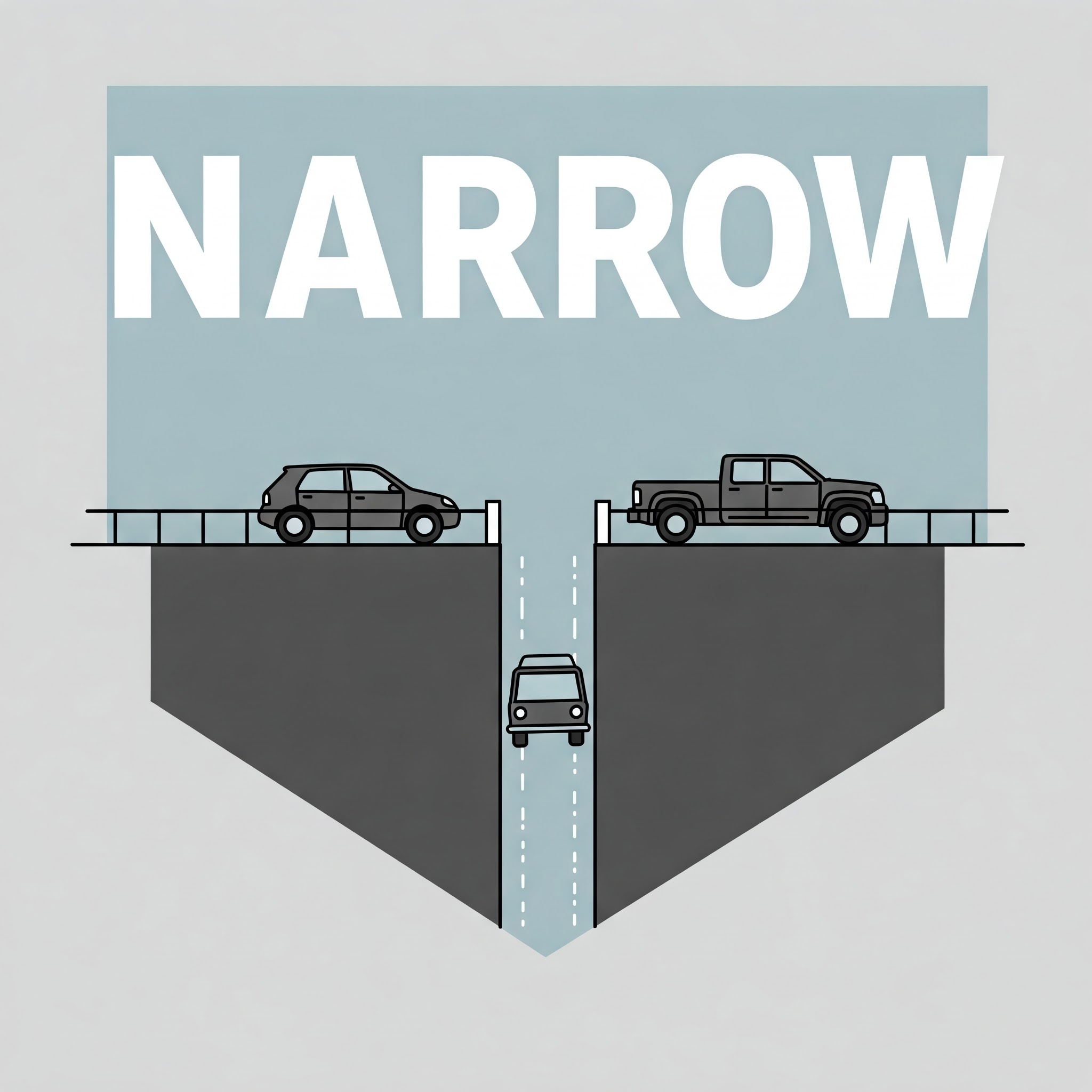Narrow
Definition
Narrow is an adjective describing something of limited width or extent. It can also mean restricted in scope, range, or focus. Additionally, it can function as a verb meaning to reduce in width or restrict in scope.
Parts of Speech
- Adjective
- Verb
Pronunciation
American English
- IPA Pronunciation: /ˈnæ.roʊ/
- Respelling: NA-roh
British English
- IPA Pronunciation: /ˈnær.əʊ/
- Respelling: NAR-oh
Etymology
The word "narrow" originates from Old English "nearu," meaning "constricted" or "tight," which is derived from Proto-Germanic "*narwaz" and Proto-Indo-European "*ner-," meaning "to constrict or bind."
Derivatives
- Narrowly (adverb)
- Narrowness (noun)
- Narrow-minded (adjective)
- Narrower (adjective, comparative)
- Narrowing (noun, verb)
Synonyms
- Slender
- Restricted
- Confined
Antonyms
- Wide
- Broad
- Expansive
Usage
The term "narrow" is commonly used in physical and metaphorical contexts. For example: "The alley was too narrow for the car to pass," or "The debate focused on a narrow range of topics."
Related Terms
- Width: The measurement of how wide something is.
- Restriction: A limitation or constraint.
- Focus: The center of interest or activity.
Detailed Definitions
Adjective
- Of limited width: Describes something that is small in breadth.
- Example: "The bridge is too narrow for two vehicles."
- Restricted in scope or range: Refers to something limited in extent or applicability.
- Example: "The study has a narrow focus on urban development."
Verb
- To reduce in width: Describes the action of making something narrower.
- Example: "They plan to narrow the road to create more pedestrian space."
- To restrict or limit: Refers to reducing the scope or extent of something.
- Example: "The options were narrowed to three candidates."
narrow



🇨🇳 Mandarin
- 狭窄 (as an adjective)
- IPA: /ɕja˧˥ ʈʂai˧˥/
- Respelling: xiázhǎi
- 缩小 (as a verb)
- IPA: /suɔ˨˩˦ ɕiaʊ˥˥/
- Respelling: suōxiǎo
🇮🇳 Hindi
- संकीर्ण (as an adjective)
- IPA: /səŋkiːrn/
- Respelling: sankīrṇ
- संकुचित करना (as a verb)
- IPA: /səŋkʊtʃɪt kərnɑː/
- Respelling: sankuchit karnā
🇪🇸 Spanish
- Estrecho (as an adjective)
- IPA: /esˈtre.tʃo/
- Respelling: estrecho
- Estrechar (as a verb)
- IPA: /esˈtɾe.tʃar/
- Respelling: estrechar
🇫🇷 French
- Étroit (as an adjective)
- IPA: /e.tʁwa/
- Respelling: étroit
- Rétrécir (as a verb)
- IPA: /ʁe.tʁe.siʁ/
- Respelling: rétrécir
🇸🇦 Modern Standard Arabic
- ضيق (as an adjective)
- IPA: /dˤiːq/
- Respelling: ḍayiq
- تضييق (as a verb)
- IPA: /tadˤɑjːaq/
- Respelling: tadāyaq
🇧🇩 Bengali
- সংকীর্ণ (as an adjective)
- IPA: /ʃɔŋkirnɔ/
- Respelling: shongkīrṇa
- সংকোচন করা (as a verb)
- IPA: /ʃɔŋkɔtʃɔn kɔra/
- Respelling: shongkochon kora
🇷🇺 Russian
- Узкий (as an adjective)
- IPA: /ˈuskʲɪj/
- Respelling: uzkij
- Сужать (as a verb)
- IPA: /sʊˈʐatʲ/
- Respelling: suzhat'
🇵🇹 Portuguese
- Estreito (as an adjective)
- IPA: /isˈtɾejtu/
- Respelling: estreito
- Estreitar (as a verb)
- IPA: /isˈtɾejtaɾ/
- Respelling: estreitar
🇮🇩 Indonesian
- Sempit (as an adjective)
- IPA: /səmpit/
- Respelling: sempit
- Menyempitkan (as a verb)
- IPA: /mənjəmpitkan/
- Respelling: menyempitkan
🇩🇪 German
- Schmal (as an adjective)
- IPA: /ʃmal/
- Respelling: schmal
- Verengen (as a verb)
- IPA: /fɛˈʁɛŋən/
- Respelling: verengen
🇯🇵 Japanese
- 狭い (as an adjective)
- IPA: /seːmai/
- Respelling: semai
- 狭める (as a verb)
- IPA: /seːmeɾɯ/
- Respelling: semeru
🇻🇳 Vietnamese
- Hẹp (as an adjective)
- IPA: /hɛp˧/
- Respelling: hẹp
- Thu hẹp (as a verb)
- IPA: /tʰu hɛp˧/
- Respelling: thu hẹp
🇰🇷 Korean
- 좁은 (as an adjective)
- IPA: /t͡ɕop̚ɯn/
- Respelling: job-eun
- 좁히다 (as a verb)
- IPA: /t͡ɕop̚hida/
- Respelling: jobhida
🇹🇷 Turkish
- Dar (as an adjective)
- IPA: /daɾ/
- Respelling: dar
- Daraltmak (as a verb)
- IPA: /daɾaɫtˈmak/
- Respelling: daraltmak
🇵🇰 Urdu
- تنگ (as an adjective)
- IPA: /təŋɡ/
- Respelling: tang
- تنگ کرنا (as a verb)
- IPA: /təŋɡ kəɾnɑː/
- Respelling: tang karnā





